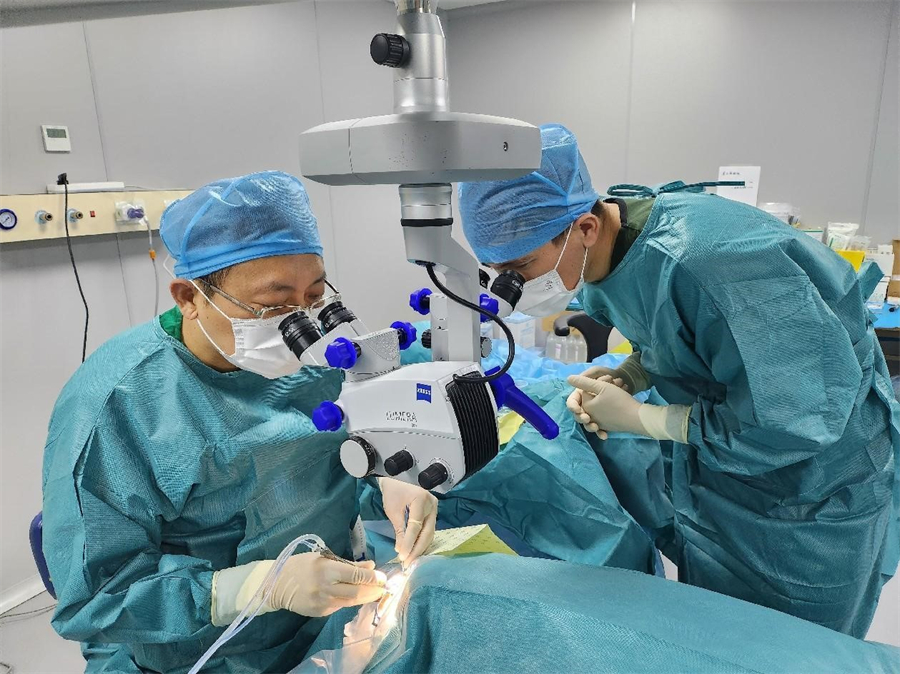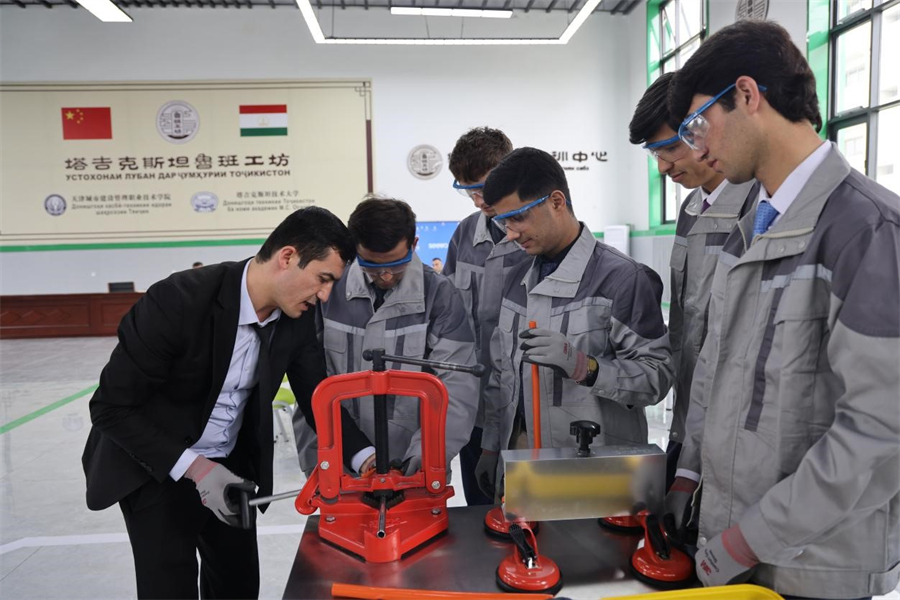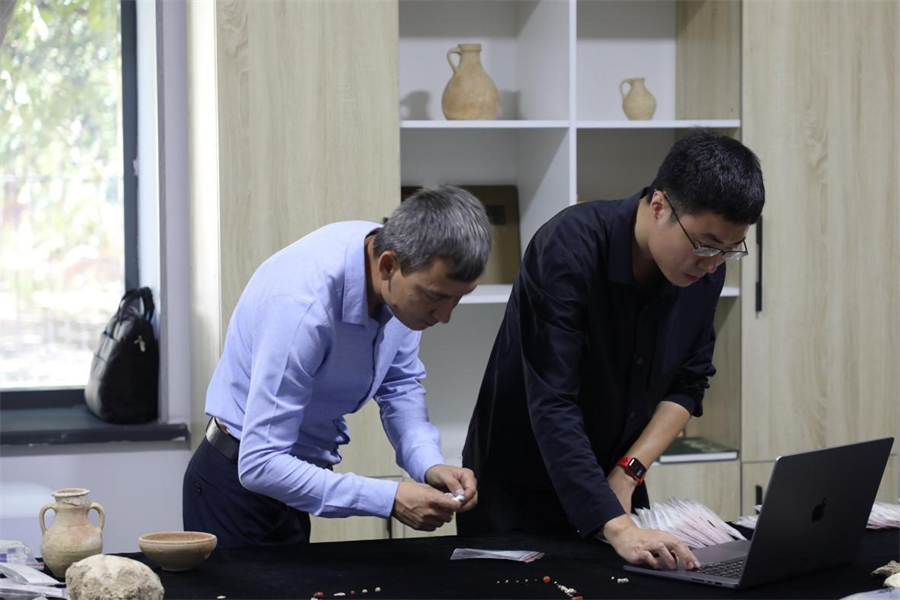Carrying forward "Shanghai Spirit" to strengthen mutual learning among civilizations
Interactions between civilizations provide the most solid foundation for the development of the Shanghai Cooperation Organization (SCO), and people-to-people exchanges provide the strongest driving force for the organization.

A chief physician from Peking University People's Hospital and an Uzbek doctor jointly perform a cataract surgery for an Uzbek patient. [Photo/Bao Yongzhen]
Since the establishment of the SCO, its member states have deepened mutual learning among civilizations, deepened good-neighborliness and friendship, and strengthened people-to-people connectivity, practicing the Shanghai Spirit of mutual trust, mutual benefit, equality, consultation, respect for diversity of civilizations and pursuit of common development, and jointly building an SCO community of cultural exchanges.
The Chinese side has been actively exploring new channels for cultural cooperation to enhance the international communication capacity of the SCO, such as establishing a media cooperation mechanism, hosting the SCO Media Summit, and holding the Media and Think Tank Forum for SCO Countries.
It supports expanding channels for non-governmental exchanges among SCO member states to bring their people, youth in particular, closer to each other. China has launched relevant activities related to the SCO University, hosted SCO Youth Campuses and invited youth leaders of other SCO member states to visit China.
Diverse yet concrete initiatives are being implemented. SCO deputy secretary-general Nurlan Yermekbayev noted that the Shanghai Spirit charts the course for different countries and civilizations to get along with each other.
At the 23rd Meeting of the Council of Heads of State of the SCO, China proposed that in the coming three years, China will provide SCO member states with 1,000 International Chinese Language Teachers Scholarships, offer 3,000 "Chinese Bridge" summer camp opportunities, and invite 100 young scientists to China for scientific research exchanges.

A Tajik professor instructs students to operate devices donated by China at the Luban Workshop in Tajikistan. [People's Daily/Yan Huan]
In recent years, the Chinese side has been actively promoting the SCO to launch more down-to-earth projects of people-to-people exchange in various fields, aiming to build a bridge of mutual understanding and friendship among the peoples of SCO member states.
With a people-centered approach, SCO health cooperation has been continuously improved. China has actively promoted resource integration and expanded pragmatic cooperation among institutions. The China-proposed Lifeline Express International Sight Saving Mission and the establishment of a traditional medicine alliance have opened up new prospects for health and medical cooperation within the SCO.
After China announced to carry out 2,000 free cataract operations for SCO member states at the 22nd Meeting of the Council of Heads of State of the SCO in 2022, there has been a surge of patients seeking treatment in Uzbek hospitals, in hope of restoring their vision.
China has provided support for the restoration of historical sites and archaeological cooperation in SCO countries, launching joint archaeological surveys at the ancient city of Rahat in Kazakhstan, a Buddhist temple on the west side of the Krasnaya Rechka site in Kyrgyzstan and Itchan Kala, the walled inner town of the city of Khiva in Uzbekistan.
Following a joint application by China, Kazakhstan and Kyrgyzstan, the Silk Roads: the Routes Network of Chang'an-Tianshan Corridor was inscribed on the UNESCO World Heritage List. It marked the first transnational World Heritage application, building powerful momentums for SCO member states to jointly protect cultural heritage.

At the Samarkand Archaeological Institute, Chinese and Uzbek archaeologists sort cultural relics unearthed at the Rabat site, Surxondaryo Region, Uzbekistan. [People's Daily/Wang Xiaobo]
Technology is key to solving global issues, while open sci-tech cooperation remains a desired approach. In recent years, SCO member states have increasingly deepened their non-governmental exchanges in science and technology. Through joint R&D, people-to-people exchanges, technology transfers, and various other activities, they have built powerful drivers for sci-tech progress, economic growth, livelihood improvement, and common development.
In Pakistan, the country's first smart distribution centers jointly built by China and Pakistan has increased package sorting efficiency of local e-commerce companies by four times, with the rate of package misclassification dropping from 1 percent to less than 0.03 percent.
The first Luban Workshop, a Chinese-supported vocational training facility, in Central Asia has been launched in Tajikistan. Catering to the country's need for economic development and industrial upgrading, it offers courses on urban heating application and engineering measurement technologies, thus building a talent pipeline for Tajikistan's future development.
The observation area of China's FY-2 meteorological satellites covers SCO countries including Kazakhstan, Kyrgyzstan, Russia, Tajikistan, Uzbekistan, and Pakistan. Through weather forecasting, disaster prevention and mitigation as well as other services, the satellites have effectively enhanced the capabilities of these countries in monitoring weathers, climate and ecological environment.
In the past days, the SCO has always been glittering with a brilliant light of people-to-people exchange. Looking ahead, the organization will keep setting examples of regional and international cooperation on promoting harmonious coexistence among different civilizations and renewing the everlasting friendship of people from all countries, through its efforts to advance people-to-people exchange.
























